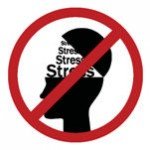Last year, The Guardian Newspaper produced an article entitled ‘recession causes surge in mental health issues’. The year before, The Independent produced an article on the increase of stress in women. Yesterday, Mail Online has published an article on stress and the increase of ill health. With the everyday person struggling financially, a cause of and / or made worse by the recent economic crisis, Christmas can be an added stress.
Years ago, I undertook a diploma that had a great emphasis on stress management. I learnt a lot about stress including how to identify my stressors and so prevent any ill health.
Stressors are extreme stimuli – too much or too little of almost anything; often unpleasant, injurious, or painful stimuli. They are also anything that an individual perceives as a threat (real or imagined) and arouse fear or anxiety. Stressors differ in individuals and in one individual it can be throughout the day.
My father used to tell me when I was at school that negative stress can be turned into positive stress. In fact, we need a bit of stress to get us out of bed in the morning. We need to have challenges to achieve a sense of personal accomplishment. Otherwise our skills will be under-utilised. We could become bored through lack of stimulation. This could all lead to a lack of purpose or meaning in life.
Optimum stress is what we need: a perfectly manageable balanced life even with ups and downs. Job satisfaction and a sense of achievement allow us to coast through our day without much problem leaving us pleasantly tired by the end of the evening.
Too much stress can be produced by disorganisation, bad time management, relationship problems, etc. A constant feeling of too much to do, without rest and fun, creates a permanent overdrive but without achieving expected results. This can trigger a breakdown!
Extreme stress can be identified through excessive drinking or smoking, dependence on sleeping pills or tranquilisers. Accidents might also occur due to preoccupation with unresolved tensions. Also, extreme stress can cause violence through an individual attacking someone or inciting others to attack him / her.
However, sometimes the opposite reactions may occur. A person can become withdrawn through the deterioration of relationships.
This can be avoided if individuals or others around them recognise the signs and take appropriate steps. But if they continue their efforts, despite exhaustion, they are likely to have a mental or physical breakdown such as severe depression or coronary heart attacks.
Examples of positive stress:
- Feeling confident to overcome a challenge
- Promotion at work
- Moving to a nicer place
- Falling in love
- Feeling invigorated and exhilarated by a competitive sport
Examples of negative stress:
- Being stuck in a traffic jam
- Computer breaking down
- A job interview going badly
- Having to learn a difficult task
- Last minute revision for an exam
In the next blog I will talk more on the symptoms and signs of stress and how to react more positively to stressors. I will also provide information on how to test your stress levels.
In the final blog I will provide tips on how to manage stress through time management; relaxation tips; and the effects of nutrition and sleep on stress levels.











